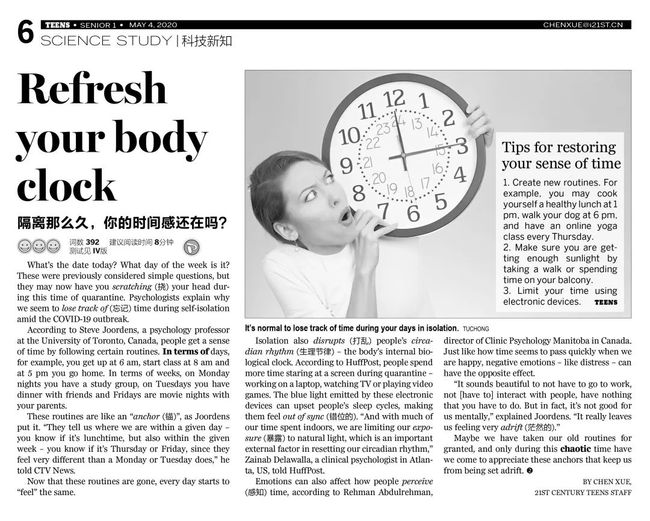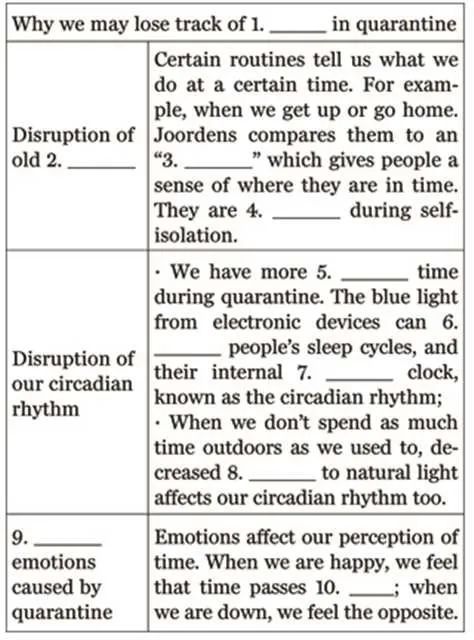隔离那么久,你的时间感还在吗? | TEENS好文精选
“TEENS好文精选”定期推送《21世纪学生英文报》(TEENS)中的精选文章,部分文章配有音频或视频、知识点解析、测试题、课件或课程等学习和教学资源,内容丰富、形式多样~
今天的精选文章“Refresh your body clock 隔离那么久,你的时间感还在吗?”来自《21世纪学生英文报·高一》第791期第6版。

Refresh your body clock
隔离那么久,你的时间感还在吗?
What’s the date today? What day of the week is it? These were previously considered simple questions, but they may now have you scratching (挠) your head during this time of quarantine. Psychologists explain why we seem to lose track of (忘记) time during self-isolation amid the COVID-19 outbreak.
According to Steve Joordens, a psychology professor at the University of Toronto, Canada, people get a sense of time by following certain routines. In terms of days, for example, you get up at 6 am, start class at 8 am and at 5 pm you go home. In terms of weeks, on Monday nights you have a study group, on Tuesdays you have dinner with friends and Fridays are movie nights with your parents.
These routines are like an “anchor (锚)”, as Joordens put it. “They tell us where we are within a given day –you know if it’s lunchtime, but also within the given week –you know if it’s Thursday or Friday, since they feel very different than a Monday or Tuesday does,”he told CTV News.
Now that these routines are gone, every day starts to “feel”the same.
Isolation also disrupts (打乱) people’s circadianrhythm (生理节律) –the body’s internal biological clock. According to HuffPost, people spend more time staring at a screen during quarantine –working on a laptop, watching TV or playing video games. The blue light emitted by these electronic devices can upset people’s sleep cycles, making them feel out ofsync (错位的). “And with much of our time spent indoors, we are limiting our exposure (暴露) to natural light, which is an important external factor in resetting our circadian rhythm,”Zainab Delawalla, a clinical psychologist in Atlanta, US, told HuffPost.
Emotions can also affect how people perceive (感知) time, according to Rehman Abdulrehman, director of Clinic Psychology Manitoba in Canada. Just like how time seems to pass quickly when we are happy, negative emotions –like distress –can have the opposite effect.
“It sounds beautiful to not have to go to work, not [have to] interact with people, have nothing that you have to do. But in fact, it’s not good for us mentally,”explained Joordens. “It really leaves us feeling very adrift (茫然的).”
Maybe we have taken our old routines for granted, and only during this chaotictime have we come to appreciate these anchors that keep us from being set adrift.
本期报纸电子版请点这里

报纸配套课件
| 高一 |
本期报纸配套PPT课件请点这里 |
测试题
阅读短文并根据文章内容完成表格,每空一词。
点击空白处查看答案
1. time 2. routines 3. anchor 4. gone
5. screen 6. upset 7. biological
8. exposure 9. Negative 10. quickly










